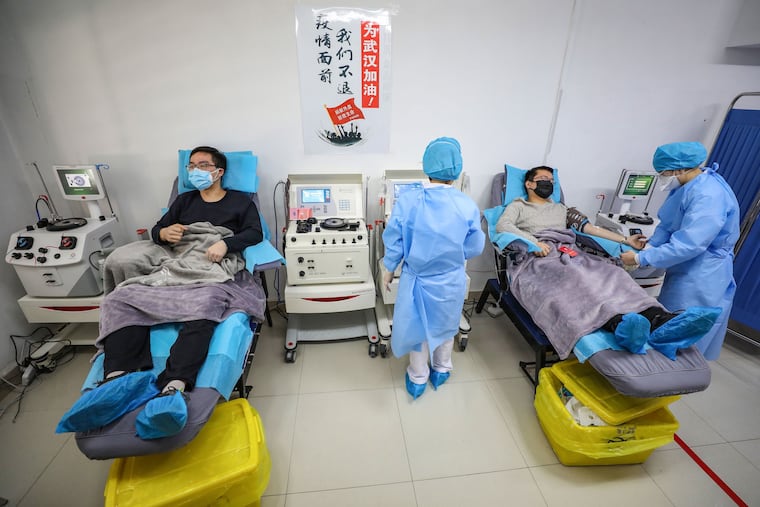Penn student in Wuhan: How my life has changed since coronavirus | Perspective
"Frustration hit me hard at first. My plan for this semester was ruined. I was forced to stay at home most of the day, watching my friends at Penn carrying out their daily lives on campus through social media."

Many “surprises” have already struck countless global citizens in 2020, and I am no exception. Born and raised in Wuhan, China, I am currently pursuing a bachelor’s degree at the University of Pennsylvania. I was supposed to be back on campus now, but because of coronavirus and China’s recently established travel restriction policy, I am forced to take a leave of absence this semester.
Here’s why I wasn’t able to fly to Philadelphia before the coronavirus outbreak: In December 2019, I traveled back to Wuhan to enjoy the winter break with my family. On Jan. 2, I went to the U.S. consulate in Guangzhou to attend an interview for my F1 visa renewal, hoping to embark on a new semester in less than two weeks. My passport was held by the consulate as part of the procedure. However, my visa application status continues to be shown under Administrative Processing and I haven’t received it back. Without a passport, I couldn’t catch my flight, which was originally scheduled for Jan. 12.
Then came the coronavirus outbreak. Under the pretext of preventing further infection, the Chinese officials shut down the city of Wuhan completely. All public transportation, including airports and highways, was closed.
The residential committee of my complex has been monitoring activities in common areas and prohibiting residents from leaving their apartments. The residential service manager also demanded body temperatures of all residents to be taken and updated to the committee every day. Now, the whole community relies on the internet to order food and other commodities. Through an online shopping platform in WeChat, residents in our apartment place orders as one unit and wait for them to be delivered on Mondays. Thus, my Monday routine includes:
10 a.m.: Call my friends in Wuhan or at Penn to catch up.
2 p.m.: Take body temperatures for myself and my family and report them to the residential committee.
3 p.m.: Read both domestic and foreign news and collect most updated information of the virus outbreak.
5 p.m.: Put on a mask and goggles and wrap myself in plastic to go downstairs to get groceries.
Elderly folks who live alone have no idea how to participate in online ordering. So I, along with other volunteers in our community, order more food together and deliver it to them (while wearing protection suits or plastic bags). I have also participated in an online donation held by our residential committee to local hospitals. I’m proud that my family donated the most in our complex.
My experience is not unique in Wuhan. Most residential complexes in Wuhan operate similarly to mine.
The coronavirus outbreak made me feel more connected to Wuhan and its people than ever before.
Frustration hit me hard at first. My plan for this semester was ruined. I was forced to stay at home most of the day, watching my friends at Penn carrying out their daily lives on campus through social media. It almost felt like taking a long, dull break and not knowing its end.
However, as I sat down and started contemplating, I realized the blessing in disguise: If I were to fly back to the U.S., I would be immensely worried about my family while unable to offer any meaningful help to my hometown. Now being in Wuhan, I have the opportunity to support my family and contribute to the local community during such a hard time.
Due to the large quantity of infected people, the number of beds in hospitals is far from enough. Since the outbreak, many schools, expo centers, and sports stadiums have been turned into temporary inpatient centers, adding more than 10,000 beds for patients. But behind patients’ gradually satisfied needs is the immense sacrifice made by frontline medical workers. Several thousand doctors from other provinces were sent to Wuhan — but it still isn’t enough. According to the news, more than a thousand medical workers were infected. There was also a scarcity of clean and nutritional food for patients and medical workers in hospitals.
Our family’s company produces and sells Chinese medicinal and nutritional canned soups, which are heat and serve. These soups can boost patients’ and doctors’ immunity and help fight the virus. We are currently investigating ways to systematically deliver them to local hospitals and offer them to medical workers and patients for free.
It seems that crises really can build tighter bonds among people. The city of Wuhan has received love and donations from all over China and around the world. People have also been offering encouragement and sending prayers to families of the dead. I personally have began calling friends and relatives in Wuhan, some of which I haven’t had the time to talk to for years but now feel the urge to reconnect with.
The coronavirus outbreak made me feel more connected to Wuhan and its people than ever before. I love Wuhan, and I will stand with my hometown till the end.
Zhexuan Huang and his family remain healthy. He hopes to return to University of Pennsylvania in the summer.